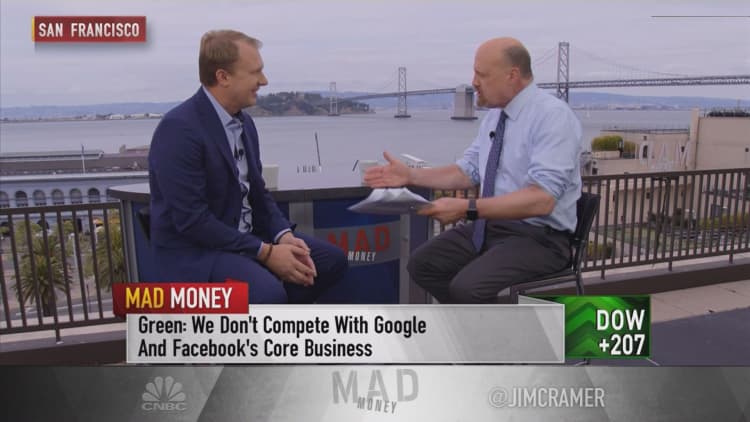In the world of advertising, The Trade Desk is a known name. But the ad-tech company wants industry players to understand how it stands out, especially in a time where it hints players like Google and Facebook are threatening the open internet.
The nearly 10-year-old company helps clients like Procter & Gamble and agency holding companies like Omnicom Group target and reach audiences across media formats and devices. It has also become vocal about what it says are unfair practices in digital advertising, blasting Google recently for an inability to be objective when serving both ad buyers and ad sellers.
The new campaign doesn't call out competitors by name, but discusses how it's different than "walled garden" companies, which don't give advertisers a full picture of how their ads are performing. Facebook and Google are often cited as examples of those "walled garden" companies. The campaign also says when media-buying companies also function as social media or content platforms, those companies want clients to direct campaign budgets that way, creating a conflict of interest.
The new Trade Desk campaign arrives as tech giants are under antitrust scrutiny from regulators. Google, for instance, is being investigated by 50 attorneys general for its dominance of advertising markets and use of consumer data. Another investigation is examining whether Facebook endangered consumer data, reduced the quality of consumers' choices or increased advertising prices.
The new campaign kicks off Monday, the first day of Advertising Week in New York, which brings advertising executives to talk about industry issues, and is targeted at those in the marketing community, not consumers. It underlines TTD's position on the buy side ("We never steer you toward our own media assets, because we don't own any") and its claimed objectivity ("We want you to spend your ad dollars where your data leads you. That allows for transparency in everything we do…").
The campaign also highlights technology that lets marketers use their own data, and boasts about the amount of people it can reach using its platform.
The Trade Desk's chief marketing officer, Susan Vobejda, said the message of its new campaign, called "Media for Humankind," was well-timed even though the company started putting it together 18 months ago.
"The vitality of the open internet is more important than ever," Vobejda told CNBC. "Given the growing concerns of the dominant tech platforms and their use of data and their practices and the transparency of their businesses, we just feel like the time is right and that the open internet is so important, and that it's more relevant than ever."
In a blog post, Trade Desk CEO Jeff Green writes that when he started the company, advertisers were beginning to ask for an alternative to tech giants that were acting like "walled gardens" and not sharing data and information about content.
"Advertisers wanted to know what content they were supporting, how the market responded to their campaigns, and more transparency in advertising pricing and markets," he writes.
Vobejda said the intention of the campaign is to show what the company stands for and why it exists, while also driving global awareness of The Trade Desk brand.
"We're more established in the U.S. than we are in some other areas of the world," she said.
The company worked with Publicis Groupe-owned agency BBH on the campaign, which will span digital, out-of-home and print placements. It used its own technology for a programmatic-first media plan, Vobejda said.
"If you want to talk about meta, it was very meta," she said.
Despite competition, The Trade Desk is profitable: It earned $88 million on revenues of $477 million last year, and it has a market cap of $8.3 billion. Its stock price is up 78.4% this year.



